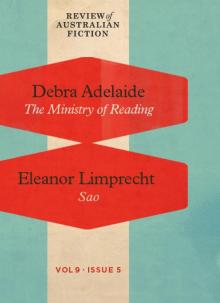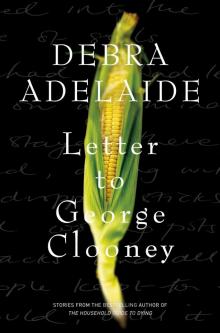- Home
- Debra Adelaide
Zebra Page 2
Zebra Read online
Page 2
Now at nights when I wasn’t lying awake thinking about the body in the backyard, I was worrying about Corky. At nights I was awake a lot, which had one advantage in that at least I was not dreaming weird dreams. And it gave me time to think thoroughly, to review the dreams I was now not dreaming, to examine all the details I could remember. Why the body was dressed in a red checked shirt, and why I didn’t know if it wore trousers or shorts. Which I should have, if I had been sawing the legs off at the knee. You would think you would notice a detail like that. I thought it was shorts, actually. Grey. Or maybe khaki. Then I considered the rest of the dismembering, what I had done with the arms. Had I sawn them off at the elbow or shoulder? I considered the whole dismembering thing. Then I wondered if dismembering had anything to do with remembering. Was it remembering’s antonym? Its evil twin? Or good one? In the morning I would have to look that up, but for the present, getting out of bed at 3 am, switching on the light and going to the Shorter Oxford English Dictionary represented too much of an admission of defeat in the battle to sleep.
Miles and Ricky had just blown out their candles and I was standing with the knife poised with one each of their hands planted on top of mine, ready to slice through the first turret, when I noticed the table. I paused and Simon looked at me.
‘What’s wrong?’ But all the kids were still hip-hipping and hooraying.
‘I’ll tell you later.’
We pushed the knife in, knocking the turret down altogether into the excellently slimy moat (green and blue jelly combined). Oscar had supplied Lego maidens which fell into the jelly while all the knights on the wafer drawbridge dropped as one. The kids cheered and hoorayed again.
Afterwards, when we were clearing up, Simon asked me again.
‘It’s this table,’ I said, speaking in a low voice though the children were in the front room watching TV. ‘He bought it. I remember now. I always thought it was ours but it’s definitely his.’
‘Gen, does this really matter? I mean, if you hate it that much we can get rid of it and buy another, but . . .’
‘It’s not that I hate it.’ Actually it was a lovable table: some honey-coloured timber, with a nice grain and a finish that resisted almost everything the family had managed to do to it. ‘It’s just that it’s his. He needs to take responsibility for it.’
Simon almost sighed. ‘Well, let’s put an ad on Gumtree.’
‘No. He’s got to take it. And everything else.’
I thought that I would feel better after dragging the table out to the front, but later when we all sat around the empty space on the dining chairs – and I had definitely bought them, each one a happy mismatch from op shops – I just felt stupid. Simon had made the children macaroni cheese, easy to manage in bowls, but he ended up taking them to eat in front of the TV. I pushed the chairs back against the walls and brought out a rug and coffee table from our study. We could eat sitting on beanbags and lounge chairs for a while, and it would still be warm enough to have dinner outside for a few weeks to come.
After raising the topic of the table, I finally mentioned Corky. My ex-husband laughed again, and it was not a nice laugh.
‘You hate anything to do with injections.’
‘Not anymore.’ Which was the truth: with four children, immunisation seemed to happen every other week and I had become quite okay around needles.
‘I’m not exchanging one dog for that pile of rubbish you’ve got out the front of your place.’
‘It’s yours. And just because I don’t want it doesn’t mean it’s rubbish.’
I was offended by the thought that I would degrade the front of my house with rubbish. And everything was as neat as I could make it, in the circumstances.
‘And that dead body is yours too,’ I reminded him.
‘You dug it up yet? Genevieve?’
This time I got to hang up on him. I had to get the children up anyway.
As it happened, the children did not want Corky here, and Simon’s loyalties were with the twins, who of course had never even met the dog. Discussing this over breakfast, they expressed interest in having a new dog, not a second-hand one, while Oscar and Nancy looked so troubled that I dropped the topic and went to make their lunches. I was thinking about that challenge to dig the body up, and wondering why I had not actually mentioned this body to Simon yet, and if I ought, when I realised I had squeezed chocolate sauce instead of barbecue onto the sausage sandwiches, and had to start again. And because I had left the children eating their cereal in front of the TV, we were running late for school and I had to drive them. I buckled Miles in first, then Ricky, then checked Miles, who after all these years still resisted seat harnesses, while the older two chattered about the bed Corky had in the garage and another in the closed-off verandah at the back, for when the weather was cold, and how every second Saturday she knew even before she heard the Prius turning the corner, and would run all the way down the driveway to be waiting for them at the gate. They loved that. She loved that.
‘So there’s a gate? Which means there’s a fence? A secure one, I hope?’
The severity of my tone made them both stop and look at me before they got into the car, and their look was just like the one Simon had given me over the table. The drive to school took about two minutes so thankfully the discussion about new or old dogs ended there.
I had intended to ring him again, but when I got home the appearance of the front struck me anew as soon as I pulled up. The table had encroached on the driveway and despite my denials I could admit that it all did look like rubbish. Falling leaves had settled onto the dust covers I had draped over the items of furniture, tools and prints. The front door was flanked by stacks of boxes and crates, and the smelly wardrobe had been obscuring light through the twins’ bedroom window for weeks. I backed the car out again and, outrage providing me with strength, dragged everything to the nature strip, even the wardrobe and dining table.
I got the broom and swept the porch and path clean, then cleared the dust and cobwebs from the front windows and shook out the doormat. Inside, starting from the hall, I worked my way back and spent the remainder of the day cleaning, even parts of the house that hadn’t been messed up by the birthday party. The kids were in front of the TV again and I was mashing potatoes when Simon walked in and gave me a kiss, removing the sugar shaker from my hand.
‘I think you meant to use salt,’ he said.
No, I thought, I was right not to mention the body to him. I would work it out myself. I had to.
When I went to bed late that night I was sure I would fall asleep from exhaustion but my mind knew better. Eventually I got out of bed, uncaring that it was well after midnight with no moon, and went down the backyard. But there is no such thing as complete darkness, not in the suburbs. In the ambient light, the plot of lawn looked the same as it always did, aside from a scattering of silvery leaves. I could have brought the torch but there was no need. I reached inside the shed where the square-mouth shovel always sat and turned around to face the lawn. After some initial resistance, the ground yielded and I marked out a rough rectangle and took off the layer of grass. Then I commenced digging, piling the earth neatly at first. The damp soil smelled wholesome in its earthiness. It was soft, friable, inviting me in. Soon I felt sweat itching in my armpits, down the small of my back, and then the work became difficult, the ground becoming colder and harder the deeper I dug.
Now I was tossing the loads of soil behind me, over me, anywhere, then throwing off my t-shirt, standing there in sleep shorts, soil and nothing else. I was only knee deep and I was covered in soil. It was such hard work, so much harder than when I was in my dream, and as I dug I wished more than anything that Corky were here to help me, and that made my chest begin to heave.
I only realised how much noise I must have been making when Simon appeared.
‘What the hell are you doing?’
&nbs
p; ‘It’s mine,’ I said, now sobbing from relief. I stabbed the shovel in again. ‘And I know I’ll find it if I just dig deep enough.’
Welcome to Country
Later that night, I was sitting out the back smoking a rare cigarette and drinking a not so rare glass of wine. White, some sort of sav blanc. Not my usual preference but something left over from ages ago, the last time I’d had people over. It was dry enough, and cold enough. The day had been exceptionally hot but the breeze was nudging the humidity away. In another half-hour or so it could even be cool.
I lit a second cigarette and turned the radio up. Set on the sort of radio station that people like me find themselves listening to, in the end, it had been humming in the kitchen behind me, in the dark. Now I listened while I smoked and sipped my wine and thought. Eventually the muffled chatter clarified from background noise to actual words, and song. I could hear distinctly the wind from the desert town of a far-off country. A place where it would be hotter right now than here.
Earlier that afternoon I had taken a small load to the charity store. This is what people did at this time of year. In my case, cleaning out the other bedroom was a long overdue task, and still a difficult one. I had sorted through the remains of clothing, outgrown or discarded, and all the cards and folders, the trinkets, toys and games, the faulty or obsolete electronic gadgets, and finally the books that surface in every generation: school atlases, paperback dictionaries bursting with stray leaves, and those novels all kids seem to acquire, even those who aren’t big readers. American Psycho. To Kill a Mockingbird. Trainspotting. All the Harry Potter books, though only the first three of these had been read.
There were old shoes, mostly stained sneakers and outgrown boots. The boots were good quality, and my size. Still, I packed them as well. I knew I would never wear them. I put them in cartons along with the old board games, including a backgammon set that was never used, and playing cards that were. There was also a guitar, several cartoon-character doona covers, and an empty CD stack.
What I had thought would take an hour or two took me most of the day. I have always considered myself a tidy sort of person, not obsessive but tidy enough, yet confronted with the entire room and its half-emptied wardrobe, I felt a mild sense of panic, as if I had no idea where to begin, or what to follow through with. I had a feeling that the task would never end. Some of the cartons which I had accumulated over the past months for this very purpose I filled with the belongings I had decided to keep, packing them neatly and marking the outsides with black texta before stacking them back into the wardrobe. I had already vacuumed the bottom of the wardrobe, and sprayed for insects. When that part of the task was done I made a coffee and, before I had even finished drinking it, went back to retrieve them, to take away too, because what was the point? I knew there was no point. But when I reopened the wardrobe door and saw the cartons I had only just marked school stuff and sport awards etc, I closed it again.
Loading up the car, I realised there was not that much. It all fitted comfortably in the boot. Despite my best intentions I had really only cleaned and rearranged most of it. And with all my dithering about, by the time I pulled up at the charity store the place was closed. In the parking bay beside the skip belonging to the store someone had already left the skeleton of a bike, a baby’s cot and mattress and a pile of bulging green garbage bags. And a CD stack, just like the one I was bringing. The empty CD stack: symbol of the charity throw-out, wherever you went, the world over, I should imagine.
I unloaded an old suitcase that I’d filled with soft toys, some of them damaged, but it was unthinkable that these go in the garbage bin. As I placed it down I noticed a rabbit’s ear sticking out of the side. Rosie. Rosie the rabbit. She had received a great deal of love once. Rosie the rabbit, she has a funny habit. I could still hear the childish refrain. What funny habit? I could not remember, or perhaps I never knew. I opened the suitcase and tucked Rosie’s ear back. She had also lost an eye, and I did remember how that happened. The dog at the time, a lumbering beast with a devoted nature and an excess of enthusiasm that was never tempered by age, made off with Rosie and chewed away an eye before we could rescue her. I remembered the wails, which went on all night, the sobbing to sleep. The even fiercer love that ensued. I almost took Rosie back to the car before I realised the futility of that, as if keeping Rosie meant anything.
I unloaded the cartons and on top of the stack placed the guitar in its cheap vinyl cover. The guitar was missing two strings; it had been cheap too, but it was serviceable, or had been. A three-quarter size, it had been replaced by bigger and better ones, which themselves had long gone from the house. It always had a decent tone, at least I thought so. But then maybe I was just a sucker, back then, for the special sound of a child first learning a musical instrument. Standing there beside the charity store, I could almost hear the chords of ‘House of the Rising Sun’ floating in the early evening air.
There was no one about. The store was at the end of a lonely strip of shops that were always shut by 5 pm. I took the guitar down again and unzipped the cover. There was an inside pouch containing a spare set of strings. I took a pair of pliers out of the car’s tool kit and sat on the kerb of the parking bay while I replaced the missing strings. I tuned the guitar, as well as I remembered how, replaced it in the cover and laid it on top of the stack of cartons. On the way home I stopped at the servo and bought cigarettes.
Halfway through the second cigarette, and I was contemplating a third. The movement of my arm from table to mouth was not enough to set off the light sensors, so the dark was now complete and, in the still night, the radio seemed even louder.
I hadn’t even looked in that skip, I realised now. I’d assumed it was already full. But now I wondered if I hadn’t wanted to look, in case of rats or something. I’d read about people sleeping in skips. Homeless kids and refugees. Town drunks. It seemed unlikely in this quiet part of the suburbs, but still, I wondered about it.
The background noise on the radio faded and the sound of someone speaking in soft accents filled the night. I realised the topic under discussion was the rebellion. Some people were even calling it war. Then I heard the call of a song, in another tongue, one both familiar and unknown. More words, then a request. The presenter commenting on the conflict. More singing, soft and plangent. A single musical instrument, something reedy-sounding, a wind instrument, but a primitive sort. It was playing a simple but unbearably beautiful tune over the desert wind, which could be heard murmuring in the background. Someone talking again, this time about desert conditions. About the wind itself. The hardship. The rebels. Instruments – but were they talking about weapons or musical ones? The beautiful reedy sound kicked in again, this time with a voice, pure, full-throated, urgent, almost angry. A woman’s voice, I thought. It seemed to cut across the country and through the soundwaves and the thick humidity where I sat in the dark, my cigarette held in suspension, burning to the filter.
The words may have been in another language but I knew what they meant. One long note stretched out for what seemed like minutes, the singer’s voice deep and resonant yet rising and falling like the desert wind. Then the presenter’s voice kicked in again only to cut out, mid-sentence. I went to the radio in the kitchen to fiddle with the dial but I knew what had happened. It was becoming more common. Sometimes it was the wind, but more often the programs that got through were detected and shut down. After a few seconds an announcer came on air to state the time and then introduce a chat show about do-it-yourself home repairs, as if the previous program had never even happened.
I grabbed the wine from the fridge and went outside but even as I was pouring my third glass I knew what I had to do. People like me, we don’t act often enough. Perhaps if I were not the kind of man I am I would not have been sitting there alone, contemplating an ashtray, an empty glass, and the prospect of drinking more or just leaving the bottle and going to bed to stare at the ceiling in the dark. I
did not know which would be worse. I tossed the wine away into the garden instead, and went inside and shut the back door.
Getting into the car, I drove like crazy, but as I approached the charity store my headlights scanned the pile of discarded belongings and I sighed in relief. The guitar was exactly where I’d left it.
I made the last flight out. It was always a late flight to that country, as if the airline decided that only the bold or the foolish held that sort of commitment, would care enough to be leaving so late, so close to the airport curfew. As if they provided a flight to support the official stance – that the country was not inaccessible – but only as a token gesture. Because who would willingly go there, given all that had happened in the last decade? And given all that had happened, I wasn’t even sure if I’d need my passport or not, but I took it just in case. Anyway, after I was finished there I might want to fly elsewhere, to a place even farther away.
At the check-in counter the assistant barely looked at my papers, uncaring who might be flying out there or why. She waved me and the guitar straight through to the boarding gate.
‘You can take that on board,’ she said. ‘You’ll have a whole row to yourself.’
It was probably deliberate that you had to fly through the night, the dark and the humming of the engine meant to lull you to sleep, so you didn’t have to think about what would face you at the end. But I remained awake the entire time. The plane was barely a third full. I could have taken out the guitar and strummed a few chords if I wanted, if I could remember any.

 Zebra
Zebra Review of Australian Fiction, Volume 9, Issue 5
Review of Australian Fiction, Volume 9, Issue 5 The Women's Pages
The Women's Pages Letter to George Clooney
Letter to George Clooney